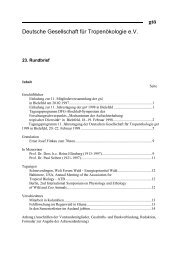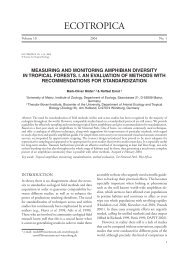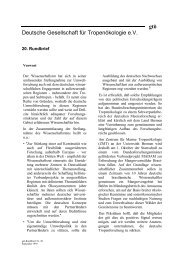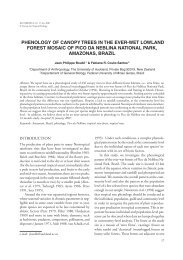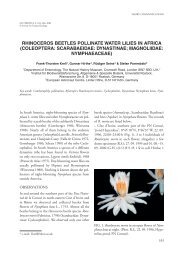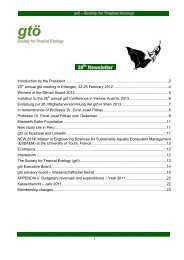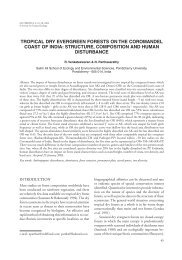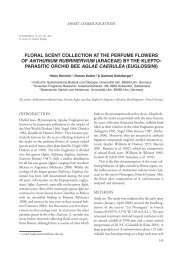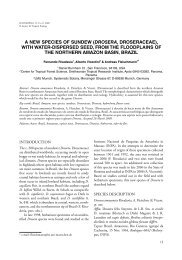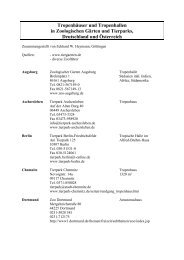182 SCIENTIFIC POSTER SESSION | FOYERSCIENTIFIC POSTER SESSION | FOYER183Topic: The Andean biodiversity hotspot and its futureCULTURAL KEY SPECIES FOR BIOCULTURAL CONSERVATION IN THEBOLIVIAN ANDESCOLLECTION AND USE OF FIELD SPECTRAL DATA FOR LAND COVERCHANGE DETECTION IN A TROPICAL MOUNTAIN FORESTGiulia Curatola 1Regine Brandt 1 , Stephan Rist 2 , Isabell Hensen 11University of Marburg, Marburg, DE, gicufe@gmail.comWEDNESDAY | FOYER1Inst. Geobotany MLU Halle, Halle (Saale), DE, regine.brandt@botanik.uni-halle.de,2Centre <strong>for</strong> Development and Environment (CDE), Bern, CHIn biocultural conservation, the concept of Cultural Key Species (CKS) provides usefulapproaches <strong>for</strong> dialogues between local actors and ecologists aiming at balancedintegration of use and conservation. The concept allows the human-environmentalrelationships to be understood and shows how cultural and biological diversity arelinked. It supports the assessment of current patterns of land and resource use, whichis of fundamental importance in agropastoral landscapes of the Bolivian Andes. CKSare characterized by high use values and have crucial socioeconomic and culturalroles. Depending on environmental and societal contexts, CKS vary according tohuman needs and their availabilities. There<strong>for</strong>e, our case study focussed on woodyspecies and addressed the following questions: Which are CKS of the area? Are CKSamong the most abundant species? Which species’ traits favour high use values ofCKS?The study was carried out in the peasants’ community Tres Cruces (2800-3800 m a.s.l.)in Cochabamba, Bolivia. For data collection, vegetation surveys (n=42) and semistructuredinterviews (individual n=10, group n=3, family n=9, transect walk n=2)were combined. For each species, their uses were grouped into 11 use categories. Usevalues (Relative Importance [RI]) were assessed and “apparency” (Importance Value[IV]) was estimated <strong>for</strong> each species using data of floristic composition. Data wereanalyzed using correlation and principal components analyses (PCA).A total of 58 woody species were identified. The shrubby Baccharis dracunculifolia DC.and Cestrum parqui L’Hér were of highest importance (IV). The trees Schinus molle L. andEucalyptus globulus Labill. were among the most useful (RI) species and thus consideredas CKS within the local context. From an ecological perspective, exotic Eucalyptus ssp.are controversial, but might be assessed within their interspecific relationships due totheir negative but also positive effects on native threatened species (e.g. Polylepis ssp.).Shown by correlation analysis, useful species were also among the most abundantplants. Availability of timber was determined by PCA as most important species’ trait<strong>for</strong> high use values, which is in line with lacking timber and fuel wood accessibilityin the area. Similarly, species’ abundance was assessed to be crucial <strong>for</strong> determiningCKS. In general, shrubs had lower use values than trees, but were shown to be moreapparent and capable of being integrated into agropastoral land use.Topic: The Andean biodiversity hotspot and its futureThe analysis of land use change of the past decades is fundamental <strong>for</strong> adeeper understanding of the natural and anthropogenic landscape dynamicsin the southern Ecuador’s tropical mountain <strong>for</strong>est ecosystem. Not only toclarify the past and present situation but also to estimate the future landscapedevelopment through predictive models. This in<strong>for</strong>mation will be finally apowerful basis <strong>for</strong> the elaboration of sustainable land use options.A time period of 35 years, from 1975 until 2010, will be studied usingmultitemporal satellite data. Particular attention will be dedicated to thespatial distribution of the Bracken fern (Pteridium arachnoideum and Pteridiumcaudatum) and to the de<strong>for</strong>estation process.Preprocessing of individual satellite scenes is a fundamental step to preparethe images <strong>for</strong> in<strong>for</strong>mation extraction. Accurate topographic and atmosphericcorrections are essential to acquire precise ground surface reflectances. For thisreason, a new physically based atmospheric and topographic program (AtToCor)was developed within the working group. After applying the correctionalgorithms using the AtToCor program and IDRISI Andes, visual comparisonof the resulting images were made. The combination of the Sandmeier & Ittenalgorithm and the Teillet.et al. c-correction yielded the best results.For the classification phase, two different methods are going to be compared.Training sites extracted from the image are used in the first approach to createthe land cover classes. However, this technique produces good results only ifexpert knowledge of the landscape characteristics is accessible. There<strong>for</strong>e,it is extremely difficult to identify sampling sites in the old images where noland cover in<strong>for</strong>mation is available. Following this method, it was not possibleto classify the Bracken fern in the 1987 image. However, the <strong>for</strong>est patternwas clearly observable because it was visually recognizable. Further researchusing field spectral data is being per<strong>for</strong>med to improve individual imageclassifications, to allow multitemporal spectral data comparison and to detectland use change in the study area.Wednesday WEDNESDAY 16:00 | FOYER | Foyergtö<strong>Society</strong> <strong>for</strong> <strong>Tropical</strong> <strong>Ecology</strong> | Gesellschaft für Tropenökologie e.V. Status and future of tropical biodiversity | Frankfurt, 21 - 24 February 2011gtö
184 SCIENTIFIC POSTER SESSION | FOYERSCIENTIFIC POSTER SESSION | FOYER185Free contributionTHE VIRTUAL LIBRARY OF BIOLOGY (VIFABIO): SUBJECT PORTAL FORBIODIVERSITY AND OTHER FACETS OF BIOLOGYJudith Dähne 1 , Gerwin Kasperek 1 , Jashar Rexhepi 1Free contributionSPATIO-TEMPORAL DYNAMICS OF SHIFTING CULTIVATIONPRACTICES OF PEMON AMERINDIANS IN THE VENEZUELANGUAYANA1Univ. Library Frankfurt, Frankfurt am Main, DE, j.daehne@ub.uni-frankfurt.deMaria Dolores Delgado-Cartay 1 , Steven Higgins² , Bibiana Bilbao³.WEDNESDAY | FOYERThe Virtual Library of Biology (vifabio, see www.vifabio.de/?lang=en) combineshigh-quality scientific sources from libraries, article databases and the Internet.vifabio’s goal is to cover biology in its entire breadth and to meet the differentrequirements of users demanding a good library service: not only molecularbiologists who want to search the latest journals, but also taxonomistswho require species descriptions from the 18th century, should be able tofind what they need. The central element of vifabio is the Virtual Catalogue:multiple libraries and journal databases and the Internet Guide from vifabiocan be searched with a single query. Links to the electronic journals libraryand delivery services simplify access to full-texts or hard copies. Modules likethe Internet Guide or the Database Guide open up further research options.vifabio offers additional services such as lists of new titles and subject dossierse.g. “Internet sources <strong>for</strong> the International Year of Biodiversity” (www.vifabio.de/iyb2010/?lang=en).vifabio is a project of the University Library, Frankfurt am Main (Germany), inconjunction with further libraries and biological organisations.1Biodiversity and Climate Research Centre (LOEWE BiK-F), Frankfurt/Main, DE,mdelgado@senckenberg.de, ²Institut für Physische Geographie. Goethe UniversitätFrankfurt/Main, Frankfurt, DE, ³Lab. Dinámica de Comunidades y ProcesosEcológicos.Universidad Simón Bolívar, Caracas, VEThe Gran Sabana, in southeastern Venezuelan Guayana, is the home of thePemon people, the biggest Amerindian group in Venezuela. Forests constitutetheir primary natural resource, as they are used <strong>for</strong> their shifting cultivation (SC)fields. However, little is known about their dynamics and impacts on biodiversityconservation. The goals of this study were: i) to quantify the spatial extent ofSC among Pemon people in contrasting socio-ecological environments; ii) tore-construct the land cover changes associated with SC in the last 20 years; iii)to identify driving factors of land-cover changes and the spatial and temporaldynamics of SC; and, iv) to asses the impact of alternative practices / land uses.We used a time series of Landsat imagery, field surveys and semi-structuredinterviews to characterize SC. Land cover maps <strong>for</strong> each date were obtainedusing supervised classification, and change analysis techniques and landscapemetrics employed to determine the magnitude and direction(s) of change.Statistical modeling allowed us to identify driving factors of the patternsobserved. Our results show a general trend of increasing number of fields and areduction of fallow period with increasing population. However, environmentalconstrains and new patterns of settlement are responsible <strong>for</strong> the non-increasein the <strong>for</strong>est areas used <strong>for</strong> SC, which determine a local dynamic of <strong>for</strong>estdegradation and a regional one of <strong>for</strong>est stability when fire is not present. Untilsustainable land uses are offered, all present alternatives imply a risk <strong>for</strong> <strong>for</strong>estconservation and the subsistence of Pemon people.Wednesday WEDNESDAY 16:00 | FOYER | FoyerKeywords: Shifting cultivation, <strong>for</strong>est conservation, land cover change, PemonAmerindian.gtö<strong>Society</strong> <strong>for</strong> <strong>Tropical</strong> <strong>Ecology</strong> | Gesellschaft für Tropenökologie e.V. Status and future of tropical biodiversity | Frankfurt, 21 - 24 February 2011gtö



